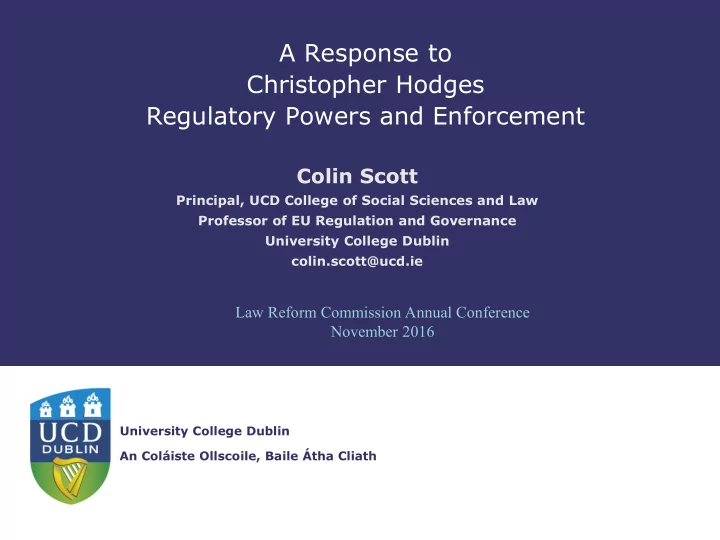

A Response to Christopher Hodges Regulatory Powers and Enforcement Colin Scott Principal, UCD College of Social Sciences and Law Professor of EU Regulation and Governance University College Dublin colin.scott@ucd.ie Law Reform Commission Annual Conference November 2016 University College Dublin An Coláiste Ollscoile, Baile Átha Cliath
Response 1. Agree that regulation is tricky because it is about changing behaviours. 2. Agree also that collaborative governance is promising – search for capacity and engage key actors with the social, market and legal pressures which promote compliance. 3. However, collaborative modes require highly skilled regulators, paying attention to all dimensions of a regulatory regime, including availability of higher level penalties. 4. Effective mplementation is technically and culturally challenging and requires learning and iteration. 5. Where collaborative modes are not well overseen/implemented, businesses have opportunities for shirking – see Honohan Report on Financial Crisis 2010. 6. Argues for more flexible toolkit, but also highly skilled regulatory cadre and recognition of wider range of actors in regulatory regimes. 7. Law reform by itself insufficient. Requires oversight of regulatory management and practice and new forms of engagement with firms.
Black’s Conceptualisation ‘regulation is the sustained and focused attempt to alter the behaviour of others according to defined standards or purposes with the intention of producing a broadly identified outcome or outcomes which may involve mechanisms of standard-setting, information-gathering and behaviour-modification.’ (p20)
Regulation • Self-Report • Rules/Principles • Inspection • Primary/Secondary Legislation • Certification • Hard/Soft Law • Audit • Associational/Bilateral Contracts • Complaints • Technical Standards • Whistleblowing Norms Feedback • Bounties (standard- (information setting) gathering) • License Revocation • Criminal Sanctions • Admin Penalties • Warnings • Advice Correction • Education (behaviour • Taxes • Private Rights modification) • Scoreboards • Media
B Responsive Regulation Really Responsive Risk –Based Regulation Nudges Meta-Regulation Social/market A pressures C D eg Boycotts Contract Buycotts Eg private standards regimes, Social Licence monitored, enforced through contracts, Self- to operate (individuated and collective Regulation (associations)) eg CSR Gatekeepers, eg insurance, banking, employment immigration contracts A – Target of Regulation – Firm, Govt Agency, NGO, Individuals B – Government (agency and/or department) C – Contracting Party (firm or government), Association (trade, sporting, etc) D – Third parties – eg consumers, NGOs, investors, competitors, employees
Enforcement Network Network Actions 1. Setting norms a. Legislation b. Compliance Programmes 2. Monitoring a. Agency oversight Agency b. Sharing Information/ Experience Department National Agencies c. Whistleblowing and complaints Overseas/Networks 3. Enforcement a. Warnings b. Contract withdrawal European Commission Enforcement c. Civil Proceedings Agency Bodies: d. Administrative Sanctions Garda Síochána e. Agency Prosecution Businesses DPP f. Cross-Sanctioning Courts Consumers, Consumer Groups Professional NGOs, Service Providers, Trade Unions Media Accountants, Lawyers
Recommend
More recommend